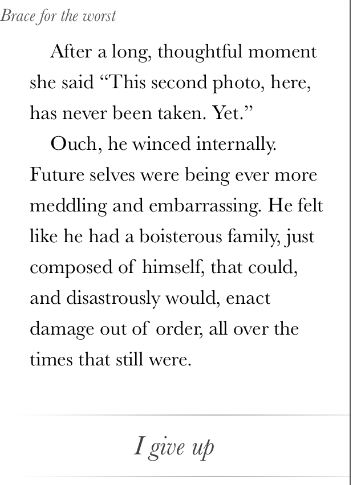By Claudia Doppioslash. Finished using iPhone.
The Man Who Killed Time pushes the limits of minimal interactivity. Cat Scratch at least had multimedia elements, but this is almost a literal ebook written in inklewriter with no multimedia and almost no choices (two of them, both minor).
Therefore, let me switch reviewer hats and ask: does it hold up as a short story?
Before getting into the plot, I should mention — contrary to the author’s apology in the blurb — the writing is pretty good. I noticed some wonkiness in the grammar:
Outside it was a shabby, and overgrown day, in some metropolis or other, in the years when those fascinating cars, that resembled more horses drawn coaches than anything else, were in fashion.
(Way too heavy on the commas. Plus, “horses drawn coaches” likely should be “horse-drawn coaches”.)
On the other hand, there are parts that could go toe-to-toe with any author, professional or not:
It was the case that he never forgot a good building. They all resided somewhere in his memory, in their own sort of Heaven, surrounded with picturesque valleys and enchanting woods. In life they couldn’t each have their own surrounding park, but he made sure that in his mind they had a grand one.
The story has the form of a traditional detective story; an angst-ridden protagonist is visited by a stranger with a case.
Excerpt here, the angst is due to the protagonist … well, not “killing time”, exactly, but developing a form of energy which uses potential unrealized reality as power. I am unclear why this kills time or has the effect it does (which has the Detective trapped in an unfamiliar universe) but I was willing to let the mysteriousness pass with the notion it would be cleared up later. Unfortunately the clearing up never happens, and I was reminded of one of those dangling plot threads of the TV show Lost with a grand setup leading to no reward.
The mystery is similar: a visitor brings a photo (mentioned in the top excerpt above) which is of herself, in the future. She requests the Detective investigate, although I was not 100% sure what she wanted to know. Again, this might have been cleared up later, but it was not.
The ending involves the Detective departing though “time” I suppose, and has one of those dangling artistic endpoints which can occasionally mark a good short story, but doesn’t work here. In the cases I’ve seen it work, some sort of satisfying action occurred in the plot, and while there might be incidents before and after, they clearly aren’t what the author is interested in nor is it necessarily the business of the readers to know.
I was instead wanting to learn more. Having said all that, if the author plans a sequel I would very much like to read it.

I just read through the story, because the writer apologized, that she is not a native speaker. Neither I am. She writes a lot, but it’s not IF, rather a short story. I didn’t really like it, but yeah, maybe a sequel is needed.
Pingback: IFComp 2015 Summary | Renga in Blue
Pingback: IFComp 2017: Salt, a partial list of things for which i am grateful, Run of the place | Renga in Blue
a form of energy which uses potential unrealized reality as power
Sounds like they might have been inspired by the Weeping Angels in the new (current) run of Doctor Who, who feed by transporting a victim back in time and living off the potential energy of the unlived life.